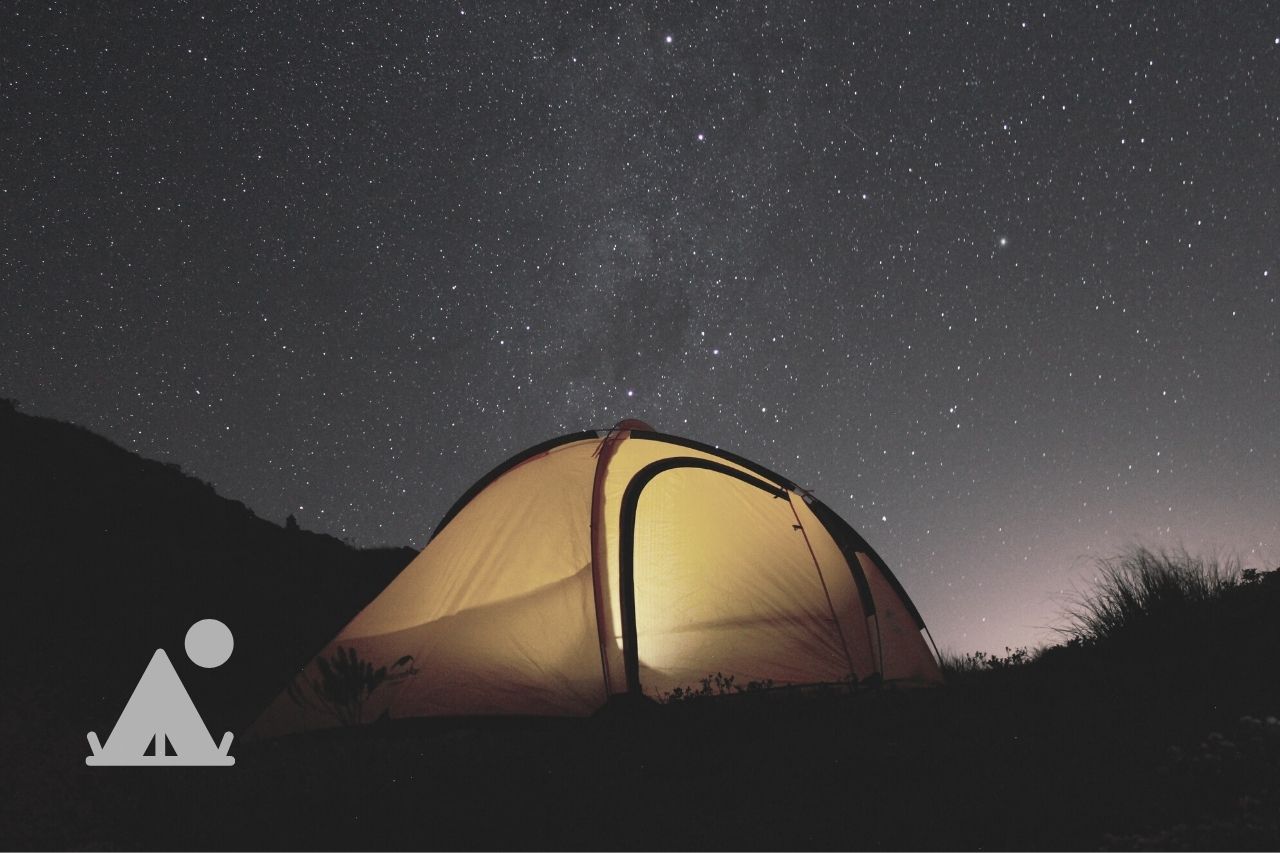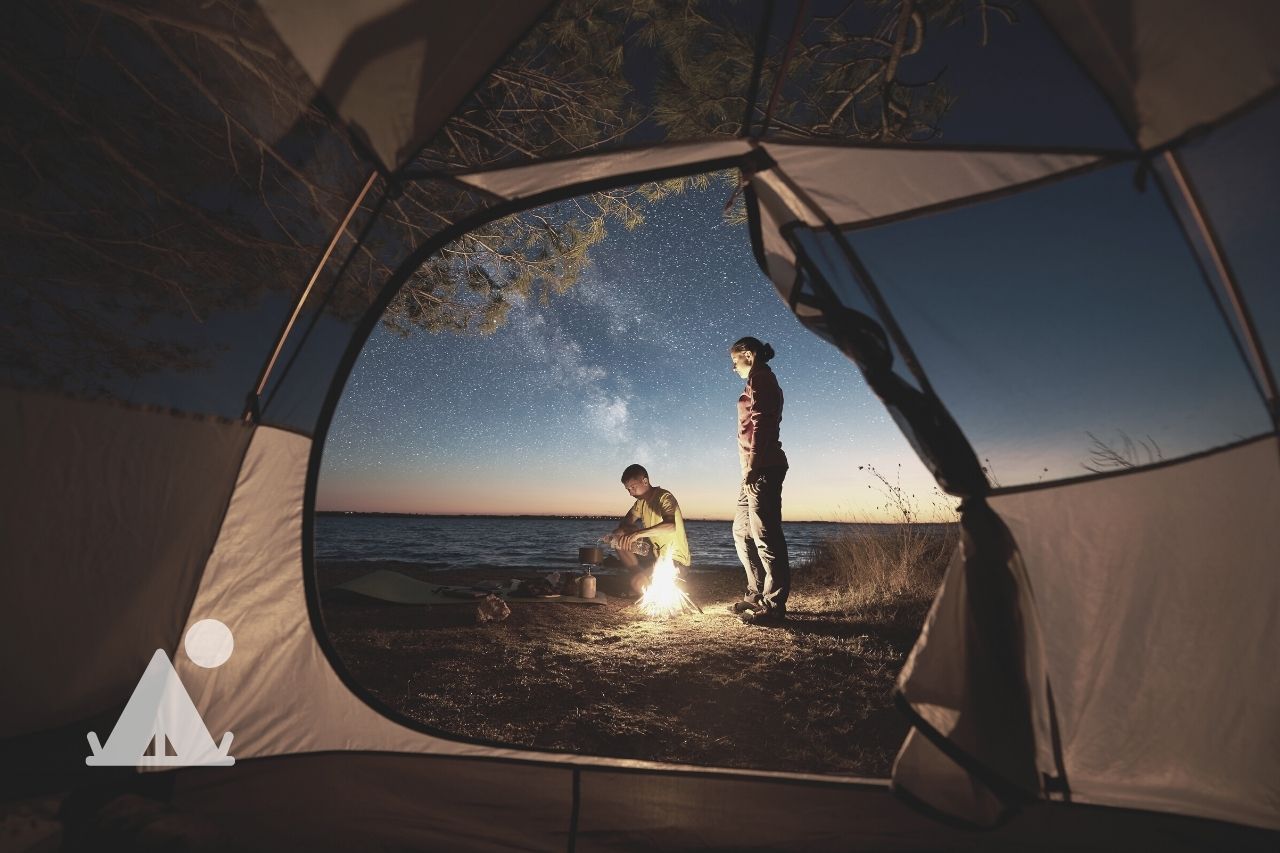Nights in the wild can be scary especially for beginner campers. But with experience, you’ll find that camping is usually safe, as long as you take the right precautions.
Below is a guide on how to stay safe camping at night and how to protect yourself from the most common dangers including wild animals, bugs, fires, bad weather, and ill-intentioned humans.
Is Camping At Night Safe?

For new campers, the thought of spending a night outdoors can be intimidating. It’s easy to imagine wild animals crashing through your tent or being attacked by some unsavory characters.
Generally, however, camping is safe.
Wild animals are afraid of humans. Even dangerous predators will lie low and stay away when they sense the presence of humans.
Unless you somehow provoke them or leave food lying around, it’s unlikely that any wild animal will bother you when camping at night.
As for 2-legged threats, as long as you are far away from a town, you are generally safe from people. Usually, thieves and muggers do not go into the wild specifically to target campers.
You should still take precautions, especially if you are a solo female camper, but there’s no need to spend the whole night on edge.
How To Stay Safe From Wild Animals When Camping At Night
1. Study the campsite ahead of time
Know what kind of environment you’ll be camping in and what animals are normally found in the area. This not only helps you decide what to carry (e.g. bear spray if there are bears or boots if there are snakes), it also lets you know what to look out for.
Depending on what you find out, you may also decide to change sites. If you are really scared of snakes, it’s probably better to avoid areas known for having a high number of them.
2. Keep food locked away (but not in your tent)
The most likely reason wild animals will poke around your campsite is because it has smelled food.
Many wild animals have an excellent sense of smell; way better than that of humans. Leaving food or scraps lying around will attract animals.
Some campsites have bear-resistant lockers to store food. You can also store food in your vehicle or hang it from a tree high above the ground.
Whatever you do, do not bring food inside your tent. It’ll attract animals right into the tent when you are asleep, increasing the risk of an attack.
3. Keep the campsite clean
Do not leave food waste or dirty utensils lying around. Animals can still smell the bits of food.
Clean up after cooking and eating.
In addition to food, pick up any other trash around the campsite such as wrappers and food containers. These might still carry smells.
4. Do not feed animals
Whether it’s monkeys, deer, bear or whichever animal you encounter, do not feed it even if it is safe to do so. Do not throw food at the animals or leave it out for them to eat.
Feeding wild animals creates expectation of food in the future from you and other campers who visit the site. It can get to a point where the animals become aggressive.
5. Keep your dog leashed
Even well trained dogs can be unpredictable out in the wild, especially when they encounter wild animals.
The dog might chase after squirrels and deer and get lost in the bushes. Or they might attract predators, posing a danger to you and your pet.
If you love to camp with your pet, keep them leashed. The trick many pet owners use is to tie a line between two trees then tie a leash to that line.
That gives the dog plenty of room to roam around while ensuring it doesn’t run off. It also ensures you follow the rules if you are at a park or camping site that requires pets to stay leashed.
Here’s a video showing such a set up. In the video the pet owner uses a store-bought kit, but you can DIY your own.
You can also tether the dog to a tree or a stake in the ground. But watch out in case it gets tangled around the tree and other objects.
Some campers also carry a portable pet fence like this one.
6. Be prepared for encounters
While wildlife encounters are uncommon, it’s still a good idea to know what to do in case you encounter an animal.
This is where researching your campsite comes in handy. If it’s a sheltered campsite with no wild animals roaming around, there’s nothing to worry about.
But if you are camping in bear country, it’s good to know how to deal with a bear. Same goes for other animals like bobcats, coyotes, mountain lions, and snakes.
Research how to deal with each animal, since they all react differently to a threat.
How To Keep Campfires Safe?

Open campfires can result in a quickly-spreading wildfire, especially if it is dry or windy. Here are some tips to stay safe as you enjoy the warmth and sounds of a campfire.
- Make sure campfires are allowed in the first place. Some sites ban fires either all the time or during specific conditions such as when it’s very windy. Enquire about campfires as soon as you arrive or before you set off on your camping trip.
- Only set up a campfire at dedicated locations. These are usually marked.
- Unless allowed and safe to do so, do not light a bonfire. It can easily get out of control. Stick to small fires. Once you get the fire going with leaves and small kindling, add large pieces of wood to keep it burning steadily without getting too big.
- Consider lighting a fire in a portable fire pit or grate. It keeps the fire contained.
- Never leave a campfire unattended. Definitely do not leave a campfire to burn overnight while you are asleep.
- To extinguish a fire, pour lots of water on the embers and ashes until the hissing sound stops. Alternatively, bury the fire with sand or soil.
- Do not burn anything other than wood. Things like aerosol cans, paper, and plastic can make a fire hazardous and spread it.
How To Stay Safe from Bugs When Camping At Night?
Unlike wild animals, bugs aren’t afraid of you. If anything, they’ll seek you out. They can be a menace or worse, a health hazard.
Here’s how to stay safe from bugs like mosquitoes, ticks, and ants.
- Choose your campaign site carefully. While that spot by the lake or river is nice, it’s likely a hotspot for bugs.
- Cover as much of your skin as possible. Wear pants and a top or shirt with long sleeves.
- Use insect repellent. You can use a combination of a cream that you apply on your skin and a spray that protects the entire tent.
- Regularly check for ticks and bugs on your skin and clothes, including when you wake up in the morning.
- Do not leave food or food scraps lying around in the tent or campsite. It’ll attract bugs such as ants.
- Try to avoid using scented products like sprays, soap, and cream. Some smells like lavender can attract bees. Bears also love the smell of mint.
How To Stay Safe From Bad Weather When Camping At Night?
Bad weather can be just as hazardous as wild animals or disease-causing bugs.
The most important thing is to be ready. Research what the weather will be where you are going. This ensures you are ready for the weather and gives you a chance to change plans if there’s a chance of heavy snow, a storm, or extreme cold.
Make sure you dress warm and carry warm bedding. If it’s winter, check that your sleeping bag is rated for an extra-cold night. If necessary, insulate your tent with a ground tap, sleeping pad, and reflective foil on the walls.
If you expect rain, be sure to carry a rainfly or tarp and set it up over your tent for extra protection.
Remember to choose your pitching location carefully. Avoid areas where water is likely to come rushing through, use trees, a tarp or even your car as a windbreak, and make sure your tent is waterproofed.
For heavy snow, a 4-season winter tent is highly recommended.
How To Stay Safe from Ill-intentioned People When Camping?
You typically don’t need to worry about people when camping in the wild.
But if you are worried about someone attacking you or stealing from you, here are some tips.
- Only camp in national parks and designated camping sites.
- Have something you can protect yourself with like pepper spray or a big stick.
- Avoid camping too close to paths and trails where people pass.
- Do not talk about your camping plans and route in public spaces like social media.
- Stay alert for unusual noises like footsteps near your tent.
- Keep your vehicle locked especially if you are in a place with lots of other campers. Also, keep your valuables like your phone and keys safe all the time. Don’t leave them lying around.
How To Stay In Contact With Loved Ones When Camping?
Always make sure you have a way to call for help in case things go wrong.
It doesn’t have to be an animal attack or a heavy snowfall that traps you in your tent. You, or someone with you, might fall sick and you need help.
You could also get injured when hiking.
Unless you only camp in specific areas with good cell phone reception, do not rely solely on your phone for communication.
Have additional equipment like a satellite communicator or a personal locator beacon.
A torch or lamp with an SOS mode can also be handy if you need to communicate your exact location or attract attention.
Before you leave home, make sure your loved ones know where you are going, the route you are going to take, and how long you’ll be gone.